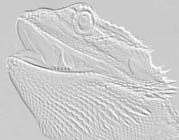 |
 |
||||
 |
|||||
|
Constipation Feeding and heating your Beardie properly and enabling it to engage in a regular daily activity routine will result in an eating-and-pooping machine, with feces deposited regularly. A Beardie who stops pooping for several days while continuing to eat daily, could have a problem. The longer it goes without defecating, the more serious the situation. As wastes back up in the system, the chances of organ failure and death increase. First, check the enclosure temperatures. Constipation occurring during the winter is generally caused by the ambient enclosure temperatures dropping unnoticed by the owner as the overall temperatures in the home fall in response to colder winter weather. Adjusting the heating sources to provide the proper basking temperatures is generally all that is required to restore regularity. Bathing and massaging may be required. Bathe the constipated Dragon in warm (about 95-99º F) water for 10-15 minutes and gently massage the belly for several minutes or so while it is still in the water. Be careful not to push too hard. Let the Beardie stay in the warm water (rewarming as necessary to maintain the proper water temp.) for at least another 5-10 minutes. The Beardie should defecate within 24 hours if the blockage is due to being too cool, having a very small piece of ingested substrate, or a very mild case of internal parasites. If the blockage is due to heavy parasite infestation or a larger blockage, then the bathing and increased heat will have little to no effect and the Beardie must be seen by a vet. I do not recommend the use of laxatives, especially without a veterinarian's supervision. Severe MDB and paralysis may also lead to constipation. Again, a vet visit will be required to determine the cause and treatment.
Diarrhea Parasite infections, including worms and protozoans, may cause loosening of the fecal mass to the point where it no longer holds its shape (see photo below). The urates (white part) may be tinged reddish or rusty in the case of some protozoan infections. The feces of such Beardies often smell rank. When infected with Giardia, they may smell quite strongly and very unpleasant. Stress, a change in diet, or eating a food item that does not agree with the Beardies digestive system may also cause temporary diarrhea. Parasites should never be treated with over-the-counter medications found in pet stores. A fecal test is required to determine what organism is causing the problem. A vet may be needed to prescribe the proper medication. Always do a second fecal test after the meds are over to make sure the parasites have been irradicated. A second round of meds might be needed. When collecting a fecal sample, make sure that it is not more than a few hours old. To collect a sample, simply turn a small Ziploc baggie inside out and place it over your hand like a glove. Scoop up the poop and turn the baggie right side out. Seal it up and take it to the vet right away. It's also a good idea to write your Beardie's name, age, your name, and phone number on the baggie. Please see the Parasites and Feces page for more info. Also, read about how you can easily do your own fecal testing at home. |
|||||
 |
|||||
| A good poo will hold it's shape, like in the photo above. The fecal mass is usually brown or green in color. Beardies that are on diets that are mostly greens and pellets tend to have a greener poo. The poo above is Ojay's. He loves his silkworms and crickets and eats very little greens this time of year (spring). So his poo is brown. The white part (urates) should be fairly white. Or it could be slightly discolored if your beardie is on meds. | |||||
| This information should be used only as a reference tool and should not be used in place of vet assistance. My views and opinions are the result of hours of dedicated research. But remember, I am not a professional. If you have a sick beardie and don't know what to do, don't play God, take him to the vet immediately. | |||||
|
Copyright
© Beautiful Dragons. All Rights Reserved.
This website may not be copied or reproduced without my permission. |
|||||